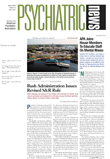Although it can be difficult for residents to publish original research, one benefit of a new feature in Psychiatric Services is making it easier.
The monthly, peer-reviewed journal that recently became free to all U.S. and Canadian APA members is now accepting submissions for a series of articles by trainees, as well as articles for trainees and about trainees.
“It is very important for psychiatry residents to have an opportunity to get published while they are in training,” said Michelle Riba, M.D., an APA vice president and member of the Psychiatric Services Editorial Board. “Similarly, it is important. . .to publish articles of interest to residents.”
Avram Mack, M.D., is editor of the new series. He is APA’s member-in-training trustee and a fellow in adolescent psychiatry at the New York State Psychiatric Institute/Columbia-Presbyterian Medical Center. Mack is soliciting articles focusing on trainees in psychiatry, including residents and fellows, as well as psychiatrists who have just completed residency. The articles may be written by residents, fellows, early career psychiatrists, or psychiatric educators.
Some examples of topics that Mack suggested for submissions were “how residents in this country are learning, different types of residency programs, and certain features of these programs.”
He is also soliciting articles that report on research undertaken by trainees regarding psychiatric services provided to patients.
As the series’ first editor, Mack’s task is, in part, to lay the groundwork for future editors of the trainee-oriented series. He will also work with members-in-training, as well as Psychiatric Services Editor John Talbott, M.D., and the journal’s editorial board to identify a selection process for future editors for this series.
“We hope that this series will be useful for all those involved in psychiatric education and resident training,” Talbott said.
The regularity of the series will be determined by the volume of acceptable submissions, according to Mack.
Submissions should be formatted according to the “Information for Authors” section of Psychiatric Services on page 613 of the May issue. This information is also posted on the journal’s Web site at http://psychservices.psychiatryonline.org/misc/ifora.shtml. Those seeking advice about whether an intended submission is appropriate may contact Avram Mack, M.D., by e-mail at [email protected]. ▪

